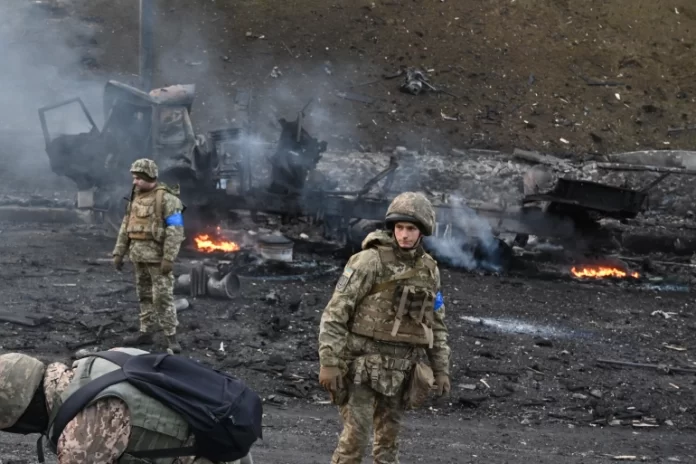Pacific Island states are paying close attention as the world responds to conflict between Russia and Ukraine.
Dr George Carter, an expert in geopolitics and director of the Australian National University’s Pacific Institute, said island countries would be assessing their geopolitical ties.
“The war [between] Ukraine and Russia tells us that we are also living in a time that inter-war between countries is possible,” Dr Carter said.
“This is something that is and should be of concern to Pacific Island countries.”
Dr Carter said respect for the sovereignty of nations was an important principal that Pacific Islands wanted to see upheld.
They unanimously voted in favour of a resolution calling on Russia to withdraw its forces from Ukraine in a meeting of the United Nations General Assembly last week.
But China, which is a major development partner to the Pacific, abstained from the vote.
“Countries in the Pacific, as well as organisations, as well, as NGOs, are thoroughly looking at the inaction in action in terms of China, in terms of … its abstention in many of the votes,” he said.
“But also, at the same time, the inaction by India … at the UNGA.”
Dr Carter said Pacific nations may be impacted if military, diplomatic and economic resources from global development partners such as Australia and the United States were detracted from the Pacific as a result of the conflict.
But for others, U.S involvement in the war between Russia and Ukraine is seen as a more direct threat.
Dr Lisa Natividad, a professor of social work at the University of Guam, said her island was a target because it is home to a large U.S military base.
“Clearly we are involved in that story, because where, where a lot of the big guns are kept,” she said.
“Even though we may not be so directly mentioned or understood to be a part of the tensions that’s growing, we as well are also impacted with the threat.”
Meanwhile, British High Commissioner to PNG Keith Scott has backed PNG on its position at the UN General Assembly singling out that Russia’s attack on Ukraine is an attack on everyone.
“Russia has called on PNG to adopt a “more reasonable and balanced approach to the situation” – let’s ask those thousands of Ukrainian civilians, women and children cowering in terror in their cellars or fleeing for their lives how reasonable or balanced the Russian approach seems,” he said.
High Commissioner Scott said Ukraine may be 7500 miles from PNG but Russia’s deliberate and cynical attempt to destroy the very foundation of international relations and the UN Charter brings the threat much closer to home.
As the Secretary-General has said, the use of force by one country against another is the repudiation of the principles that every country has committed to uphold.
“There is no justification for the aggressive course of action Russia has chosen. “Russia must urgently de-escalate and withdraw its troops.
“It must be held accountable and stop undermining democracy, global stability and international law. For all our sakes, the rule of law must prevail over the rule of the gun.”
On 24 February, Russian forces launched an unprovoked and premeditated attack on Ukraine, a sovereign and democratic country in Eastern Europe.
Cities have been bombed, thousands killed or injured and almost 2 million refugees – mainly women, children and the elderly – have been forced to flee to neighbouring countries.
In an Emergency Special Session of the United Nations (UN) General Assembly on 02 March, Papua New Guinea joined 140 other countries, including all the Pacific Islands, in deploring the Russian aggression and its violation of international law and the United Nations Charter.
Only four – Belarus, North Korea, Eritrea and Syria – supported Russia. “Let’s be clear: what Russia has done is wrong and unacceptable. These are not my words but those of the UN Secretary General.
“The UN Charter is unambiguous: ‘All members shall refrain in their international relations from the threat or use of force against the territorial integrity or political independence of any state.’
“Even now, the Russian government is trying to mislead the world, inventing fake pretexts and imaginary threats, in order to mask its carefully planned aggression and deflect the world’s attention from the violence it has unleashed.
“As a Permanent Member of the UN Security Council, Russia has a particular responsibility to uphold international peace and security.
“Instead, President Putin has chosen to violate the borders of another country and launch a campaign that is causing widespread suffering, threatening global stability and raising international tensions,” he said.
SOURCE: ABC/PACNEWS














